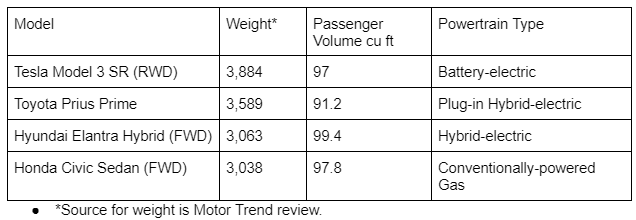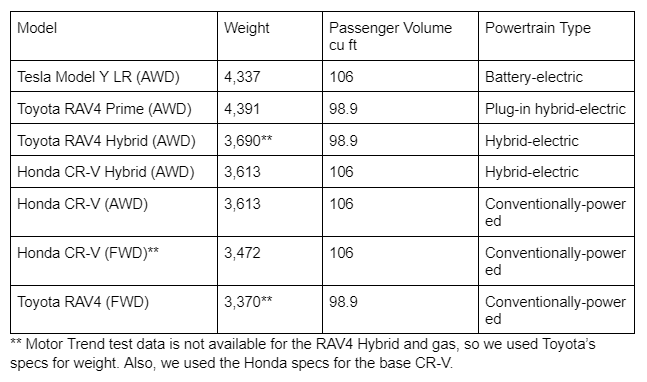Many negative stories about battery-electric vehicles (BEVs) are grounded in the fact that EVs are heavier than conventionally powered vehicles of similar size and passenger volume. The pro-EV crowd says the stories are nonsense, since the weight of EVs is “similar” to conventional vehicles. The other side disagrees apparently, since they wrote stories based on the weight of EVs being a major factor. Let’s not use a straw man argument about these stories. Here are some specific stories that cast BEVs in a negative light that are based on the EVs having a heavier weight:
-IIHS Says EVs Are Dangerous Due to Weight
-Wall Street Journal Story Says EV Weight Contributes to Particulate Pollution
-The Telegraph Says Heavy EVs Cause Twice As Much Road Damage (Potholes)
-Automotive News Says Heavier EVs Cause Safety and Pollution Problems
-Gizmodo Says Heavy EVs Wear Out Tires Super Fast In Warm Climates
-Grist Says Heavy EVs Shed More Air Pollution From Tires Due to Weight
In this story, your author will not choose a side. Instead, I’ll simply lay out facts related to electric vehicles. For the weight of the vehicles in this story, I will use Motor Trend test and review data for the weight of the vehicles listed. This is a respectable outlet and I prefer to use their measurements than to use manufacturer’s data when it is available.
When it comes to delivery data, there are only two segments that matter: sedans and crossover SUVs. That’s because the auto industry has not yet moved toward electric trucks in great numbers - yet. That is the direction the industry seems pointed, but so far, the GMC Hummer, Ford F-150 Lightning, the Rivian R1T, and the Tesla Cybertruck don’t add up to a hill of beans in terms of ownership numbers- yet. Massive SUVs from Hummer and large SUVs from Rivian and Kia are in production, but again, relative to the volume of sedans and crossover SUVs, they don’t add up to any meaningful numbers. We will do a separate story on those future players.
How Much Heavier Are Battery-Electric Sedans Compared to Other Types of Cars?
Our first analysis examines the top-selling battery-electric sedan, the Tesla Model 3. For our comparison, we selected the Standard Range, rear-wheel drive version of the Model 3. It has less mass than the other Model 3 trims, so any contrast with other types of vehicles will favor the Model 3. In other words, we are being kind to the EV here. For comparison, we chose a variety of popular and high-volume cars similar in size to the Model 3. The Prius Prime is a plug-in hybrid-electric vehicle and a top seller of its type, so we used it even though it is a smidge smaller and technically a five-door hatchback.

Our analysis revealed that the Tesla Model 3 SR, in its rear-wheel drive trim, has an additional 846 pounds, 27% more than the conventionally powered Honda Civic's weight, which is virtually identical in size. The Model 3 is 821 pounds heavier than a Hyundai Elantra Hybrid-electric vehicle, which equates to a 26% difference in mass. The Prius Prime is a plug-in hybrid-electric vehicle. The U.S. Department of Energy considers PHEVs “EVs.” That drives the EVangelists crazy, but it is what it is. The PHEV is 295 pounds lighter than the BEV in our comparison, so it is roughly half-way between the conventional car and a BEV in terms of weight.

The Model Y is the top-selling BEV, and we used its least expensive AWD version for our weight comparison since it is a crossover SUV. The RAV4 and the CR-V are the closest two top-sellers in its size category. The RAV4 is available in three different powertrain configurations. Its PHEV version has a slightly higher weight than the Tesla Model Y BEV. The Model Y is 1,000 pounds greater in mass than the RAV4 base trim, which equates to about a 30% heavier weight.
Weight Comparison - Battery Electric Vehicles vs. Conventionally-Powered Vehicles
Our data shows that electric sedans are about 821 pounds heavier than comparably-sized conventionally-powered sedans. That equates to a 27% weight disparity. The Model Y electric crossover SUV is 1,000 pounds heavier than comparably-sized conventionally-powered crossover SUV, which equates to a 30% weight disparity.
Charts and images by John Goreham.
John Goreham is an experienced New England Motor Press Association member and expert vehicle tester. John completed an engineering program with a focus on electric vehicles, followed by two decades of work in high-tech, biopharma, and the automotive supply chain before becoming a news contributor. In addition to his eleven years of work at Torque News, John has published thousands of articles and reviews at American news outlets. He is known for offering unfiltered opinions on vehicle topics. You can follow John on Twitter, and connect with him at Linkedin.
Set Torque News as Preferred Source on Google












Comments
Just one question Were the…
Permalink
Just one question
Were the ice vehicles full or empty of gas when weighted
Fair question as it is not…
Permalink
In reply to Just one question Were the… by Robin English (not verified)
Fair question as it is not specified. Let's assume it's without filled tank. The Honda CRV used in the table has a fuel tank of about 15 gallon. Let's assume it's on average always 2/3 filled. At 6.1 lbs/gallon that brings 15 * 2/3 * 6.1 = 61 lbs additional. That brings the CRV (AWD) from 3613 lbs to 3674 lbs, to compare to the model Y of 4337 lbs. Delay goes from 724 lbs to 663 lbs. As they picked the lightest Tesla trims, that 10% change isn't impacting the storylibe and is within margin.
Your comment that the…
Permalink
In reply to Fair question as it is not… by Bart (not verified)
Your comment that the lightest Tesla trim isn't factually correct in all of the comparisons here. For example, they use a Tesla Model Y Long Range AWD in one comparison, which is the heaviest trim of any model Y. In addition, the 'comparable' ICE vehicles seem to be some of the lightest vehicles with a similar body size and volume. I can easily pick different vehicles that meet these same criteria and 'prove' that EV's weigh less than gas cars. To do a valid comparison, you can't just randomly (or intentionally) pick certain vehicles. You need to do a statistical comparison of ALL (or at least a statistically significantly sample) gas and electric vehicles to get a true picture.
But in reality, real world data (and physics) show that passenger cars are not responsible for the majority of road damage. Heavy vehicles are responsible for the majority of road wear and damage, and in particular 80,000 pound semi trucks. It's probably true that an EV is heavier than an ICE vehicle - an estimate based on real-world data is that an EV weighs around 15% more. But the damage to roads, bridges and other infrastructure caused by passenger vehicles is insignificant compared to the damage of heavy commercial vehicles.
It's estimated (and shown with physics, and real-world data) that heavy vehicles are responsible for over 99% of all damage - so removing ALL passenger vehicles from roads would change the outcome very little. The 'heavy EV' line of thought makes for good social media arguments, but in the real-world EVs contribute a nearly-unmeasurable impact to road wear.
With selective data selection I can 'prove' that EVs are lighter than gas cars. I drive a Model 3 standard range RWD that weighs about 3800 pounds. The average gas car weighs about 4200 pounds according to the EPA and industry sources.
People assume that electric cars are heavier overall because they have heavy batteries, but don't acknowledge that gas cars have very heavy engines, transmissions, and differentials made of cast iron and cast aluminum.
Much of what people 'know' about EVs is based on biased analyses like the one presented in this article and then get repeated as fact without any contextual data.